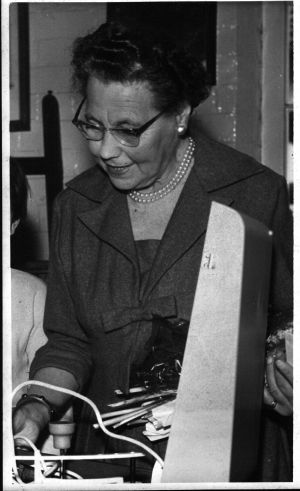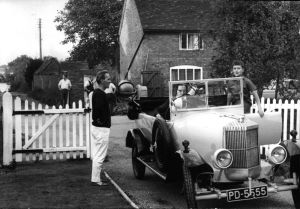Prospect House (Dodds): Difference between revisions
No edit summary |
No edit summary |
||
| (One intermediate revision by the same user not shown) | |||
| Line 31: | Line 31: | ||
The man who bought it for, I think the princely sum of £3,300 was a property developer, who promptly removed the old character of the ale house. The room where the men of the village smoked their clay pipes and drank their beer and where, some years later, Doris gave her piano lessons and Floss her violin lessons, was amalgamated into the hall. The small store rooms, one of which contained the entrance to the beer cellar, disappeared altogether. |
The man who bought it for, I think the princely sum of £3,300 was a property developer, who promptly removed the old character of the ale house. The room where the men of the village smoked their clay pipes and drank their beer and where, some years later, Doris gave her piano lessons and Floss her violin lessons, was amalgamated into the hall. The small store rooms, one of which contained the entrance to the beer cellar, disappeared altogether. |
||
Ralph's business was removed to The Lindens, though, by that time, he was near retirement, and the house unofficially known as 'Dodds' became 'Dodds' when Miss Horstman bought it |
Ralph's business was removed to The Lindens, though, by that time, he was near retirement, and the house unofficially known as 'Dodds' became 'Dodds' when Miss Horstman bought it. |
||
The house reverted to its previous name 'Prospect House' in 1987 when it was combined with the neighbouring [[Easter_Cottage|Easter Cottage]]. |
|||
Latest revision as of 16:04, 30 October 2022
THE TENANTS OF PROSPECT HOUSE (DODDS)
As far as is known, this house has always belonged to wheelwrights, but in the 1800's (and possibly centuries before) it was also an alehouse and shop where villagers drank in the room to the right of the front door and smoked their clay pipes, but what they bought there, I suppose only they can tell.
Originally it was thatched, but the roof was raised and tiled and the brick frontage put on, around the beginning of the nineteenth century. The front garden belonged to the Lord of the Manor and was sold to Thomas Spilsbury in 1843 for £1. The house had been lived in by the Spilsbury's since at least the beginning of the 19th century. They were a large family of wheelwrights who owned other property in the village.
The Dodd family originally came from Warwick and settled at Preston and for many generations they supplied the farmers of Preston with wagons. Eventually one of their descendants, William Coldicott Dodd came with his young bride to Clifford Chambers and moved into Prospect House.
The front garden became a vegetable garden shaded by an apple tree producing two kinds of apple – blenheim and wyken pippin. The present drive was full of wagons in process of being made, and wheels. Mr. Dodd was also the Undertaker, but the coffins were made and stored away from the public eye.
Mrs. Dodd died early in their marriage and eventually Mr. Dodd met a schoolteacher from Knowle, Leah Woodfield, and they married in 1897. Ralph, their oldest child was born in 1898 and Doris in 1910, and they had a normal happy childhood of that period. About 10 years after, Floss was born and soon after Mrs. Dodd became ill with arthritis, and it was possibly that which affected Flossie's upbringing.
Ralph and Doris attended the village school Flossie stayed a t home being taught by her mother. Ralph and Doris had been allowed to play with the village children, but Floss was kept a virtual prisoner in her own home. Her little wistful face could often be seen looking through the bars of the gate at the children playing in the street. Even when she became a teenager, she wasn't allowed out unaccompanied. As an adult, she had to stay at home and look after her mother. The only time she was allowed to go to work was during the war when she worked, I think, at Josephs making parts for the fighter aeroplanes. He relaxation was in the violin and with her brother and sister accompanying her, she played in the orchestra for the Stratford Operatic Society; Ralph and Doris taking singing and acting parts.
Ralph, leaving school at the age of 12, worked for his father until the 1st World War and then found himself in the terrible fighting at the Somme,at the tender age of 17. After the war. He not only plunged into work at his father's workshop, but added his baritone voice with many others in the Stratford Operatic Society which had only just then started. A young soprano claimed his attention, Kathleen Victoria Phyllis Mc Neil. They eventually married in 1935 - and the same year his father died. But Ralph carried on with the business.
It was Doris who became so popular and was so well loved. Alex her nephew had been known to say that his Aunt Floss never went to school and his Aunt Doris never left it! She stayed at the village school almost until she died in 1960. When she reached the age when she could no longer be called a scholar, she became a pupil teacher and then an Infant Teacher. At the same time she took over the Church Choir. Up until then, there had been a small choir run by Miss Monica Pippet. For most of that time, Doris, Ralph and Flossie had been members, sitting in primitive choir stalls with a harmonium to accompany them. (The present choir stalls and organ didn't arrive until 1931)
When Doris took over, she took her responsibilities very seriously. She travelled to London once a week to take music degrees at both the Royal Acadamy of Music and the London College of Music, taking and passing exams held in London and having the initials LLCM and LRAM added to her name.. Also, being so close to the children of the Parish, she kept an ear open for any musical talent. Through her efforts the choir stalls were full each service - with a waiting list!
The children loved her; the adults respected her and the Choir practice was so enjoyable that everyone eagerly awaited the next practice. She organised the concerts in The New Room (reached by way of The Nashes), and sang and played at concerts in other villages. The concerts were mainly for enjoyment, being the only entertainment of that time, but, during the Second World War, the concerts were held to raise money to buy food and pay for postage in order that the Clifford boys overseas could have a food parcel.
Doris suffered as a diabetic and in the end, it tragically took her life. Towards the end, she developed cataracts and became blind, playing the organ by ear. She valiantly carried on with her work in the Church, and in the school until she became too ill to do anything.
Doris died Easter 1960. Floss was on her own. Her arthritic (and sometimes quite unreasonable) mother had died in 1944. Within a few months, Floss had sold the house which had been prison to her for so many years in her early life, and moved to Quinton.
The man who bought it for, I think the princely sum of £3,300 was a property developer, who promptly removed the old character of the ale house. The room where the men of the village smoked their clay pipes and drank their beer and where, some years later, Doris gave her piano lessons and Floss her violin lessons, was amalgamated into the hall. The small store rooms, one of which contained the entrance to the beer cellar, disappeared altogether.
Ralph's business was removed to The Lindens, though, by that time, he was near retirement, and the house unofficially known as 'Dodds' became 'Dodds' when Miss Horstman bought it.
The house reverted to its previous name 'Prospect House' in 1987 when it was combined with the neighbouring Easter Cottage.

